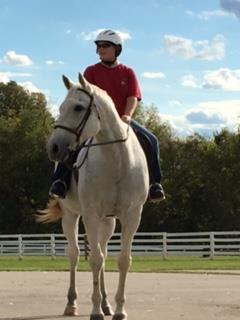
Central KY Riding for Hope: Advocates for Ability
In 1981, Dr. Peter Bosomworth, Debbie Marcum, Rusty Cheuvront, Becky Howard, Jim Howard, and Mary Quattrocchi launched a dream. They believed so strongly in the benefits of horseback riding for individuals with disabilities that they founded Central Kentucky Riding for the Handicapped. The non-profit was renamed Central Kentucky Riding for Hope (CKRH) in 2004.
CKRH broke ground in 2006 at their current facility, which includes a barn, indoor arena, educational space, and office. In fall of 2011, a riding and education complex was completed. Today, CKRH provides therapeutic riding, hippotherapy, equine-facilitated mental health services, equine-facilitated learning, and therapeutic horsemanship to the community.
Much of the equine-facilitated learning at CKRH occurs in partnership with the area public schools; students who aren’t successful in a traditional school setting attend classes at CKRH and work with horses as part of their education. There are 65 students currently enrolled in the program. Pat Kline, the current executive director of CKRH, believes in the power of this program. In her words, “These children are empowered by their relationships with the therapy horses, and those who show an interest have more advanced opportunities to learn higher level equine skills and participate in natural horsemanship training techniques.”
The 27 horses currently at CKRH are indispensable partners of the organization. Six of these horses are off-the-track Thoroughbreds, who reached the program through a variety of venues. Kline, describes, “The Thoroughbreds typically make another stop between the racetrack and here. We hope that they come to us trained really well.”
Once a horse reaches CKRH, they begin a 90-day trial period which determines whether they would make a successful therapy horse. The staff rides and trains the horses extensively to ensure they are prepared to work with therapy students. The amount of time and energy CKRH invests in this training is reciprocated by a lifelong career of service by the horse. Kline affirms, “When we have a horse in our program, we hope it doesn’t leave. The horses here are part of the team; none of what we can do is possible without just the right horses.”
Kline claims CKRH is unique from other Thoroughbred aftercare programs because their mission is to provide equine-assisted activities and therapies. The retired racehorses who find a home at CKRH “know they have a career for life”. They become part of the CKRH team.
Thoroughbreds aren’t part of the CKRH team by chance; they are selected for skills unique to their breed. They are successful in the veterans program started just a few years ago because of their spirit. Kline describes, “The veterans really want to ride the horses rather than be led around. Some of the Thoroughbreds fit that bill because they have more ‘get up and go’ than our typical therapy horses.” Thoroughbreds are also great for teaching the children in the school program because of their “in-the-moment responses”. Kline says this instantaneous feedback helps the children to self-correct and develop interpersonal relationship skills.
When asked what the biggest success of CKRH is Kline points to the individuals who benefit from the programs. She says, “It might be the 12-year-old child who speaks for the first time; it can be the day that you look out your window and see someone sitting upright who originally had no trunk control; it could be the day in a lesson where a therapy horse stops because the child is about to have a seizure.” She adds that the number of students at CKRH has more than quadrupled since the new facility opened in 2009.
One of the challenges CKRH faces is having enough quality volunteers to run each week’s programs. Specifically, Kline notes that “187 volunteers need to show up each week to provide the services we offer. As of last year, we had 707 volunteers, which saved $253,106.” For a non-profit organization, these savings allows for the continued growth and success of the program.
TCA is a long-time partner of CKRH. Kline says, “TCA is a wonderful life line to us and we depend upon their assistance. They help us with caring for the Thoroughbreds we have here. For example, their donation helped us put up fences when we first moved to the new facility. ”TCA’s partnership helps fuel Kline’s dream. For her, “Making the rounds every day drives me to continue because I can see the good things happening here. Merely watching a lesson, talking to parents, talking to students, or looking around reminds me of the impact we have.”

